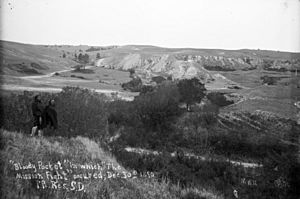Drexel Mission Fight facts for kids
Quick facts for kids Drexel Mission Fight |
|||||||
|---|---|---|---|---|---|---|---|
| Part of the Ghost Dance War, Sioux Wars | |||||||
 The 'Bloody Pocket'; location of the Drexel Mission Fight |
|||||||
|
|||||||
| Belligerents | |||||||
| Lakota Sioux Brulé Sioux |
|||||||
| Commanders and leaders | |||||||
| Chief Two Strike | |||||||
| Strength | |||||||
| 7th U.S. Cavalry 9th U.S. Cavalry |
|||||||
| Casualties and losses | |||||||
|
1 Dead: Private Dominick Franceshetti Troop G, 7 Cav. - Reported AWOL found dead later. 7 Wounded: 1 officer & 6 enlisted men Commissioned Officers 1st Lieut. James D. Mann, 7 Cav., Tp K (Died later of Wounds) Enlisted Men Private Marrion C. Hillock, Troop B, 7 Cav. Private William S. Kirkpatrick, Troop B, 7 Cav. Private Peter Claussen, Troop C, 7 Cav. Private William Kern, Troop D, 7 Cav. Farrier Richard J. Nolan, Troop I, 7 Cav. 1st Sergeant Theodore Ragnor, Troop K, 7 Cav |
Unknown | ||||||
The Drexel Mission Fight was a battle between Lakota warriors and the United States Army. It happened on December 30, 1890, in the Pine Ridge Indian Reservation in South Dakota. This fight took place just one day after the sad events at Wounded Knee. The battle was near White Clay Creek, about 15 miles north of Pine Ridge. Soldiers were checking if a Catholic mission had been burned down.
Contents
What Happened at Drexel Mission?
The Army's Mission
The 7th U.S. Cavalry, led by Colonel James W. Forsyth, was involved in this fight. This was the same group that had been at Wounded Knee the day before. They had eight troops and a battery of artillery (large guns). Their goal was to scout ahead and see if a Catholic mission had been set on fire.
The Fight Begins
While scouting, the 7th Cavalry met Brulé Lakota warriors. These warriors were from the Rosebud Indian Reservation. It was believed that these were the same Brulé Lakota, led by Chief Two Strike, who had attacked the 9th Cavalry's supply wagons earlier that morning. The 7th Cavalry found themselves in a tough spot. They were trapped in a valley by the combined Lakota forces. The soldiers were trying to escape and pull back from the fight.
Help Arrives
Colonel Forsyth asked for help. A group of soldiers from the 9th Cavalry came to their rescue. This group was known as the "Buffalo Soldiers," and they were led by Major Guy V. Henry. When the 9th Cavalry arrived, the combined army forces were able to push the Lakota warriors away. They drove them from the high ground where the Lakota had a strong advantage.
After the Battle
An Investigation Takes Place
After the Drexel Mission Fight, a high-ranking general named Major General Nelson A. Miles looked into what happened. He was in charge of the Pine Ridge Campaign. General Miles strongly criticized Colonel Forsyth. He felt Forsyth should not have allowed his soldiers to get trapped in the valley. General Miles added his findings to another investigation about Forsyth's actions at Wounded Knee. However, Secretary of War Redfield Proctor later decided to close the Drexel Mission investigation. This happened after Forsyth was cleared of any wrongdoing at Wounded Knee.
Heroes of the Fight
Several soldiers were recognized for their bravery during the Drexel Mission Fight. Three soldiers received the Medal of Honor, which is a very high award for military courage. These heroes were Captain Charles A. Varnum, First Sergeant Theodore Ragnar, and Farrier Richard J. Nolan. Many years later, Second Lieutenant Sedgwick Rice was also given a Distinguished Service Medal for his actions.
 | Sharif Bey |
 | Hale Woodruff |
 | Richmond Barthé |
 | Purvis Young |

